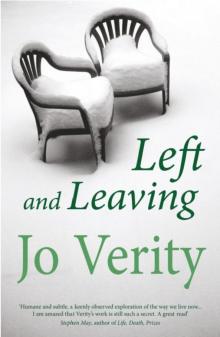Bells Read online
Contents
Title Page
Dedication
Acknowledgements
Chapter 1
Chapter 2
Chapter 3
Chapter 4
Chapter 5
Chapter 6
Chapter 7
Chapter 8
Chapter 9
Chapter 10
Chapter 11
Chapter 12
Chapter 13
Chapter 14
Chapter 15
Chapter 16
Chapter 17
Chapter 18
Chapter 19
Chapter 20
Chapter 21
Chapter 22
Chapter 23
Chapter 24
Chapter 25
Chapter 26
Chapter 27
Chapter 28
Chapter 29
Chapter 30
Chapter 31
Chapter 32
Chapter 33
Chapter 34
Chapter 35
Chapter 36
Chapter 37
Chapter 38
About Honno
Copyright
BELLS
by
JO VERITY
HONNO MODERN FICTION
For Jim
Acknowledgements
I would like to thank: Honno and the Welsh Books Council for their continuing confidence and support; Caroline Oakley, my editor, for her guidance, expertise, good humour and enthusiasm; the members of Cardiff Writers’ Circle for their encouragement and invaluable criticism; and everyone whose brains I have picked in the course of writing Bells.
1
In that No Man’s Land that lies between wedding reception and evening ‘do’, Jack Waterfield surveyed the hotel car park. The window of the fourth-floor room made an excellent vantage point as, clad only in creased-from-the-packet boxers, he watched his nearest and dearest, barely recognisable in ill-considered finery, criss-crossing the melting tarmac. Distant yet connected, remote yet concerned, he experienced a hint of the bewilderment that God – if such an old gentleman existed – unquestionably derived from scrutinising his flawed creation.
Jack pulled the waistband of the underpants away from his hot flesh, stretching the stiff elastic, encouraging the dead air to circulate around his crotch. Putting a hand inside the pants he cupped his genitals, the soft flesh clammy in his palm, then, bending his knees slightly, he allowed everything to settle more comfortably. He sighed.
Turning away from the window, he stared at his sleeping wife. Fay had chosen the bed nearest the door. The brochure claimed that ‘All our twin rooms are furnished with queen-sized beds – the ultimate luxury’ and as she lay there, the extra width of the bed made Fay look more like a robust child than a dumpy fifty-three-year-old. He studied ‘his’ bed. Crisp white sheets, a snazzy reading lamp and a clock radio – all to himself. Luxury indeed.
After the meal and speeches they had escaped to their room. He had stripped off the stifling layers of morning dress but she had refused to remove anything, not even her shoes. ‘I’ll never get them back on again.’
‘At least take your hat off, love.’ He’d made the same suggestion several hours earlier when she’d been complaining of one of her ‘heads’. The hat’s wide brim, forcing her to hold her head at an unnatural angle, was, without doubt, the cause of the trouble.
‘I can’t,’ she’d snapped. ‘My hair’s a mess.’
He’d known better than to mention that the hours and small fortune she’d spent at the hairdresser’s had, therefore, been completely wasted. Now the hat, envy of any large, nesting bird, lay on his bed.
Even in sleep, Fay looked discontented. Lips pursed and eyebrows drawn together in a slight frown, an ugly little crease running up between them, she might have been in pain. Her features were tensed but exhaustion and alcohol had slackened her neck muscles and the flesh around her lower jaw sagged. Gravity was triumphing over determination.
The gauzy dress and matching coat she wore were chiffon. He knew that because he’d heard the ensemble described at every dinner party and in a hundred telephone conversations over the past six months. The predominant colour of the outfit was strident turquoise, a colour Fay often chose. He’d asked her, a long time ago, why she never wore red – his favourite.
‘My hair.’ She’d spoken slowly, as if talking to a child. ‘Redheads shouldn’t wear red. Or purple. Or pink.’
‘But Caitlin looks wonderful in red.’ He’d pointed to their daughter as she skipped across the lawn, chased by her brothers. Fay hadn’t bothered to reply.
Although she’d finally removed the hat, his wife’s sweat-damp hair had retained its shape and now resembled a sandcastle tipped out of a seaside bucket. Were it not for her monthly visits to ‘Le Salon’ her hair would be grey and then she could wear any colour under the sun.
Fay lay on her back, perfectly still, arms at her sides, fists clenched. Her legs, too, were straight and stiff, ankles puffy and ill-defined, feet splayed, flesh bulging between the straps of her gold sandals. The body showed no sign of life. Had she died whilst he was watching the woman park the yellow ‘Beetle’ or the golfers on the driving range beyond the car park?
And what did he feel, seeing her laid out on that hotel bed? Be honest, boyo. He watched her, waiting for terror or remorse to rear up and grab his throat. He waited. Nothing came. Nothing at all. Neither desolation nor delight. Neither loss nor release. This woman who had shared his life for thirty years might be dead, and he didn’t care either way. He didn’t care enough to take five paces across the room and search for a breath or a pulse. Or to call her name gently, then louder and louder until he was sure, one way or the other.
The awareness that he felt nothing for her had the same effect as a mugging. His legs buckled and he crumpled, leaning back and sliding down the cool wall. Sobbing quietly, shoulders shaking, he rested his forehead on his raised knees. He licked his lips, tears mixing with snot and tasting of childhood miseries as they trickled down his neat beard and dripped into his chest hair. Needing to get away from the source of his collapse, he crawled across the floor to the bathroom, grazing the white skin of his insteps on the heavy-duty cord carpet. Once inside, he pulled himself up on the chrome rail, locked the door then sat on the lavatory seat, face buried in a towel, until the weeping subsided to an intermittent judder.
He breathed deeply in an effort to slow his frantic heartbeat, then, when he was calmer, he pushed his underpants off and stepped into the shower cubicle. Shoving the lever around to ‘maximum’, he released the blistering water to scour his body. It seared his scalp through the thinning grey hair, pounding his slight shoulders and coursing down his torso. Where it touched the tenderest areas – inner thigh and grazed feet – the skin turned lobster pink. When he could bear the heat no longer, he thrust the lever across to the other side and ice cold water powered down onto scalded flesh. He stifled a shriek. All the while he scrubbed himself with Fay’s loofah-glove, cleansing himself of unforgivable thoughts.
As he crept back into the room, Fay’s feet twitched, and the low sun flashed off her sandals.
‘Jaaaaack?’ A yawn lengthened the vowel, distorting his name, ‘Did I sleep?’ She pushed herself up to half-sitting, plumping her hair with her fingers. ‘You couldn’t make me a cup of tea, could you?’
‘Of course, love.’ He unplugged the kettle and took it into the bathroom.
‘And for goodness sake put some clothes on.’
If she had commanded him to stab himself in his cold, cold heart he would have rushed to find a dagger.
The disco had driven most of the guests out of the function-room, onto the terrace or into the shrubbery beyond. Occasionally Jack heard giggles or caught glimpses of pa
le clothing – or flesh? – and wished that he, too, were having fun. At least he was out of the hired suit and feeling like himself for the first time that day. And what a long day it had been. The alarm had gone off at five-thirty and, from that moment, Fay had kept him to a tight schedule.
All day he had done his duty; done whatever was asked of him without questioning or arguing. This was the first moment he’d had to himself – his first opportunity to reflect on his son’s wedding day. Where had the initial plans for an intimate family celebration gone adrift? At some point, the whole affair had been rail-roaded and the unstoppable wedding juggernaut had run away with them.
‘I don’t know what you’re getting so het up about, Jack,’ Fay had said. ‘Nia’s parents are footing the bill.’
‘I’m not het up, love. And, to be fair, we are paying for the evening ‘do’. It’s just that I didn’t think Dylan had 200 friends.’
‘You don’t begrudge your son a proper send-off, do you?’
So here he was, watching ‘The Day’ take its predictable course, indistinguishable from scores of weddings that he’d attended over the years. Amongst the frightful outfits, bizarre gifts and banal speeches, Dylan and Nia had made promises that were impossible to keep. Side by side, listening to those arcane words, Fay had squeezed his hand taking him back thirty years, to an instant when everything had been possible.
Fay had spent the first hour of the evening party complaining that she couldn’t persuade the guests to ‘mix and mingle’. He’d tagged around with her on her failing mission, but, in the end, she gave up and he tried to placate her. ‘Have a drink, love. Look, everyone’s having a great time. You’ve been the perfect hostess and now it’s your turn to relax.’
‘It’s all right for you, Jack, but someone has to stay sober,’ she snapped. ‘I’d better check the buffet arrangements. They’re bound to get it wrong if I don’t keep after them.’
‘I’ll just circulate, shall I?’ He watched her hurry off towards the kitchens.
After a day of following instructions to the letter, he was unsure what to do now and he drifted, pausing here and there for a quick ‘Enjoying yourselves?’ or ‘How’s it going?’ No one offered him a seat or included him in their conversation. And something rather weird was going on. It wasn’t that he was being cold-shouldered, they simply weren’t seeing him. Or hearing him, either, come to that. After an unsuccessful attempt to join a crowd of Dylan’s workmates, he tested his ‘invisible man’ theory by walking straight towards four young women, who were making their way from the car park. Although he smiled at them, they didn’t acknowledge him and, without deviating from their route, two passed to his right, two to his left.
‘Wow. Did you clock the Best Man’s butt?’ a leggy girl in a clinging dress asked her friends. Hands extended in front of her, palms forward, she squeezed imaginary buttocks with her long fingers. He didn’t catch the reply, lost in their laughter, as they moved away from him.
In all the years that they had been lovers, Fay had more or less avoided mentioning his body. There had been lots of remarks about his ‘lovely eyes’ and ‘nice smile’ of course, but nothing that she wouldn’t say about a brother or a friend; nothing to arouse him and make him feel like a raging animal. In the beginning, when he’d explored her body, he’d sometimes used the ancient, crude words when referring to her intimate places and his actions in and around them, the coarseness of the language increasing his pleasure. Fay seemed to enjoy what was going on but said nothing, as if she had taken a vow of silence. Those young women, striding up the path, would have no such qualms.
The path from the terrace sloped down to the overspill car park at the rear of the hotel complex. As he meandered on, the music was reduced to a bass beat and the tunes became un-nameable. Soft yellow lights, set in bollards, lined the paths through the manicured grounds, their half-glow attracting flutters of moths. The disco was scheduled to continue until midnight and it was out of the question for him to leave before the end. Room four-oh-eight, with satellite TV and his very own bed, beckoned, but that would be the first place Fay would look for him. Out here, wandering in the grounds, wasn’t a bad option. Technically he was still circulating and available, should anyone wish to find him. He wandered on, filling in time, only feeling a tiny bit guilty.
Not far off a car started, revved and pulled away. He and Fay had been chauffeured to the church and on to the reception, but his car must be somewhere down here in this car park. Caitlin had used it to bring his parents and had returned the keys to him when they were checking in. He tapped his trouser pocket and heard the familiar clink.
After the shadows of the shrubbery, the car park was harsh and threatening. The large compound, surrounded by a high wire fence and illuminated by security lights, made him think of a prisoner of war camp. He had never been in a prisoner of war camp but John Mills, caught in the glare of searchlights, flashed onto the silver screen of boyhood memory. He wandered up and down the ranks of vehicles, the distinguishing colours of paintwork modified by the mercury lights. Where on earth was his car? He pressed the bulge on his key fob, looking and listening for a flash and bleep. There it was, three to the right.
He slumped into the driver’s seat. The drinks that he had consumed through this endless day must have put him way over the limit but, starting the car, he edged out of the row. He drove slowly around the car park until he found a space under an oak tree, where the leaves obscured the relentless light.
He switched on the radio and abandoned himself to the second half of ‘The Moral Maze’. The panel were discussing the case for and against euthanasia. He pushed away the remembrance of Fay, corpse-like on the bed, and within five minutes the reasonable voice of Radio Four, and the smell of still-new car, lulled him to sleep.
2
Fay was looking forward to the journey. Train travel was such a civilised mode of transport. Expensive, though, and if she and Jack were both making a journey, they went by car. According to the departures board, the Nottingham train was due in twenty minutes.
Although it was August, a cold wind swept down the platform, peppering her face with grit, and she retreated to the café in the station concourse for her third coffee of the morning. There were a few tables, outside the main area, set aside for smokers. Of course she wasn’t a proper smoker like these desperate people around her. The only time she smoked was when she needed a cigarette. She wanted about twenty a day but needed nearer ten. In any case, she could kick the habit any time she put her mind to it. But after her early start, and with the prospect of several hours on the train, she needed a cigarette.
The coffee was dangerously hot and the cardboard cup deformed as she lifted it. The apple Danish, included in the promotion, was sticky and far too sweet and when she tried to wipe her fingers, the paper serviette shredded and small pieces stuck them. She recalled her father’s freshly-shaved face, dabs of toilet paper on his cheek and neck where he’d nicked himself. They’d bought him an electric razor for his seventieth birthday but it had still been in the box four years later when she’d helped her mother clear his things.
The station announcer ‘regretted to inform passengers that the train from Cardiff to Nottingham is running approximately twenty-five minutes late’ and expressed a hope that ‘it will not cause passengers too much inconvenience’. All around her people were making calls and she rooted through her handbag for her mobile. No point. Jack was on his way to mid-Wales with the Wicker Men and it made better sense to ring Laura when she was sure of her arrival time.
Jack had dropped her at the station over an hour ago. If she were driving, she would be on the M5 by now. She raised the coffee to her lips again and a droplet coursed down the outside of the cup, splashing on to the lapel of her pale Burberry. ‘Shit.’
The train pulled in. It was a two-carriage Sprinter, already full with passengers who had joined at Swansea or Port Talbot, but she had no misgivings about evicting the girl who was occupying her reserved seat. M
uttering obscenities, the girl hauled herself up and dawdled down the carriage. Fay stood her ground, more than a match for any insolent teenager. She dealt with dozens of them every day in the classroom.
By the time the train groaned out of the station, she felt as if she’d travelled half way round the world. The man in the adjacent seat left the train at Newport and she colonised the vacant space with her raincoat. To strengthen her claim on the territory she piled her newspaper, book and handbag on the table in front of her, then turned to the Guardian crossword.
They trundled on, losing more time. The man opposite, lapel heavy with enamelled badges, several of which had something to do with the Boy Scout Movement, informed her that once a train was late, it was very likely to get later. ‘It’s missed its slot, you see.’ He knew far too much about rolling-stock for her liking and she made an effort to avoid eye contact in case he felt the urge to do a good deed.
Sometimes fellow travellers had fascinating tales to tell. Returning from a conference in Manchester a few years ago, she’d chatted with a woman whose husband had attacked her at the breakfast table that very morning. The battered wife unwound a paisley scarf to reveal violet bruising where he had tried to throttle her. The social workers had found her a place in a refuge in Taunton, and she’d left her home in such haste that she’d had no time even to pack an overnight bag. The children were still with her husband. When Fay had expressed surprise, she’d boasted, ‘He wouldn’t lay a finger on them. He loves them to bits. He’s a wonderful father.’
Fay was off to spend the weekend with friends from her grammar school days. They kept in touch through phone calls, emails and occasional letters enclosed with birthday or Christmas cards. Naturally Fay had wanted to give Laura and Isabel the full details of Dylan’s wedding and they’d all agreed that it was a good reason to get together. The last time had been a couple years ago, at Isabel’s house in Chelsea. On that occasion they’d been summoned to inspect her new conservatory.

 Bells
Bells A Different River
A Different River Sweets From Morocco
Sweets From Morocco Not Funny Not Clever
Not Funny Not Clever Left and Leaving
Left and Leaving Everything in the Garden
Everything in the Garden